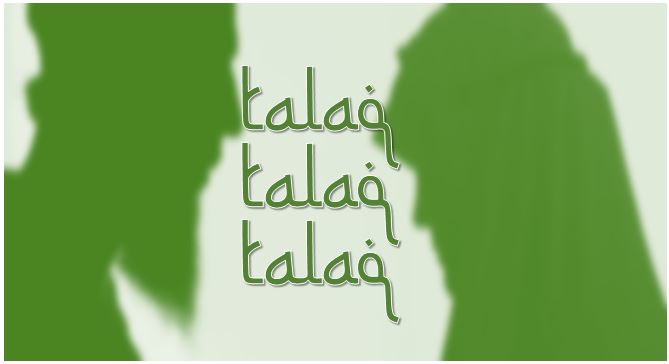There is no consensus among Islamic scholars on the validity of Triple Talaq or Talaq-ul-Bidat. Islamic law seems to have been formulated to give the couple a chance at reconciliation before they part their ways. Obviously, societal and historical factors have meant that it is easier for men to divorce their wives rather than the other way round. Strictly speaking, a man is allowed to pronounce Talaq twice, without the marriage getting annulled. One pronouncement must follow the other only after a waiting period or Iddat of approximately 3 months has been observed. This waiting period enables the couple to seek mediation or attempt reconciliation. In case no reconciliation is possible, divorce kicks in. However, the third pronouncement of Talaq results in instant divorce. There is no reconciliation and no mediation.
In India, as in many other countries, the entire process has been shortened by a pronouncement called Talaq-ul-Bidat. This means that instead of going through the motion of Talaq, mediation, Talaq, mediation and finally Talaq, a man can divorce his wife irrevocably by saying Talaq, Talaq, Talaq. This practice of Talaq-ul-Bidat has been taken to ridiculous heights by men, who these days, divorce their wives irrevocably on Whatsapp, Facebook, E-mail etc.
While many Muslim countries have amended their legal strictures in line with global trends, India, as far as this practice is concerned, continues to be stuck in the medieval age by continuing to uphold provisions of the archaic Muslim Personal Law (Shariat) Application Act 1937.
Of late, there has been a loud uproar, even by the usually docile Muslim women, to do away with this abhorrent practice.
There have been several instances of provisions of Muslim women being rendered destitute because their husbands chose to send them the Triple Talaq over mail/whatsapp/facebook.
One site, talks of a woman whose husband, working in the Middle East, dropped her a Triple Talaq over E-mail.
The Talaq was upheld by the local Maulavi as the husband proved that he had two witnesses while sending the mail. Then there is the case of Shayara Bano, whose husband sent her a letter containing Triple Talaq. Shahyara is fighting against the injustice in the Supreme Court. Jaipur’s Afreen was also divorced by her husband through a letter. She, too is fighting for her rights in the Supreme Court. It is believed that over 92% of Muslim women are opposed to the Triple Talaq.
The Bharatiya Muslim Mahila Andolan has been able to gather 50000 signatures in its drive to rid Muslim women of this odious law. Even Sangh affiliated Muslim Organizations are going on the offensive against this regressive practice. A Central Government panel, looking into this issue has recommended amendments to the Dissolution of Muslim Marriages Act, 1939. The panel is in favour of a ban on verbal, unilateral and triple Talaq. Several courts have also ruled against the Triple Talaq and have asked the couple to attempt reconciliation. That having been said, the All India Muslim Personal Law Board (AIPLMB) continues to be opposed to any changes in the Triple Talaq process.
However, Triple Talaq is probably one amongst the many problems that bedevil the lives of an ordinary Muslim woman. Islamic injunctions also speak of a Halala system which permits re-marriage of a divorced couple.
Societal and financial compulsions often mean that a woman divorced by her husband, even through the triple talaq route, are often amenable to remarry their old spouse. In such a case, re-marriage is permissible only if the woman is married post her divorce and has consummated this marriage. This often results in a thriving business where local Qazis offer themselves as a temporary husband and are more than willing to consummate the marriage. This puts Muslim women, most of them from the lower strata of the society at grave risk. There is still no guarantee that her former husband won’t divorce them after the re-marriage. Historically, the consensus among Islamic scholars was that Talaq-ul-Bidat was an innovation, to help acrimonious couples could part ways quickly. However, Ibn-Taymiyyah (13th-14th century CE) argued that Talaq-ul-Bidat was valid in normal circumstances. The views of Ibn Taymiyyah, who, incidentally is revered by Wahabis and Salafis, once considered a minority, have since been spread far and wide with the spread of Wahabi ideology.
As mentioned earlier, many Muslim countries have amended their divorce laws suitably. In 1929, Egypt, for instance Talaq, irrespective of the number of times it is said, will be counted as one. Tunisia and Algeria do not recognize any Talaq given outside a court of law.
In 1926, Turkey discarded Islamic injunctions on divorce altogether. Even in neighboring Pakistan and Bangladesh, Triple Talaq is no longer considered legally valid. However, in India, the issue of amending laws pertaining to minorities has been converted into an explosive political issue. Rajiv Gandhi’s legendary surrender to orange-bearded ulema in the Shah Bano case is well known. Any talk of Uniform Civil Code, is portrayed as a threat to the existence of minorities.
In this politically charged environment, Muslim women have perennially been denied their rights. Unlike other religious communities that have reaped the fruits of social progress, Muslims and Muslim women in particular have always been left in the hands of regressive elements. By converting Muslims into a vote bank and by building up a ghetto mentality amongst them, our politicians have ensured that the rights of Muslim women would always be pawned to the orthodox and conservatives. The need of the hour is to empower Muslim women so that they can take control of their own destiny. Repeal of the Triple Talaq would be one step in that direction.

























